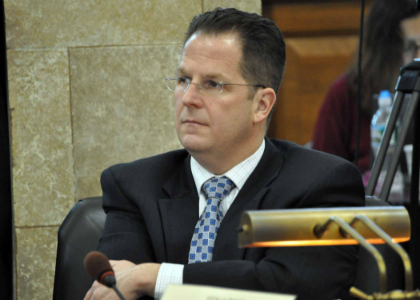
TRENTON –Legislationsponsored by Senator Brian P. Stack and Senator Loretta Weinberg that would dedicate one percent of cigarette tax and tobacco products wholesale tax revenues to anti-smoking programs operated by the Department of Health was signed into law today by the Governor.
“While the United States continues to make great strides in reducing cigarette smoking, New Jersey can help accelerate the progress by dedicating funding from cigarette taxes to programs that help to reduce smoking and promote better health for our residents,” said Senator Stack. “The money we spend in the reduction of smoking will be made back multi-fold in decreased health costs. This is a modest expenditure that will have enormous benefits.”
The new law (S-862), which would take effect, July 1, 2018, an amount equal to one percent of the total revenues collected annually from the “Cigarette Tax Act,” and the “Tobacco Products Wholesale Sales and Use Tax Act,” shall be directed to the Department of Health to fundtobacco control programs to prevent youth initiation of tobacco usage, reducing exposure to secondhand smoke, and promotion of cessation. Based on current projections of revenue, this law would provide approximately $7 million for anti-smoking programs in Fiscal Year 2019.
“Smoking does enormous damage to the health of our residents, is highly addictive and should be treated as such,” said Senator Weinberg. “The tobacco industry spends millions of dollars a year in our state promoting this carcinogen, and it’s imperative that we push back. This law will reduce the use of tobacco, a product that has caused so much damage to our populationand save lives.”
The Centers for Disease Control & Prevention estimate that New Jersey should be spending around $103.3 million in tobacco control initiatives. The state eliminated funding from the state budget for these programs in FY2012. Yet tobacco companies are spending over $177 million annually on marketing and promoting their products in New Jersey, according to a report issued Thursday. Another report by the American Cancer Society Action Network (ACS CAN) found that New Jersey is the only state in the nation that does not spend any of the money from the national tobacco settlement on smoking prevention initiatives.
The law would require that programs funded by the dedicated revenue be evidence-based tobacco control programs that align with the federal Centers for Disease Control and Prevention Best Practices for Comprehensive Tobacco Control Programs and that include the goals of preventing youth initiation of tobacco usage, reducing exposure to secondhand smoke, and promotion of cessation. It would require that funding priority be given to programs that aim to reduce the incidence of smoking among the State’s Medicaid population and youth.
S-862 was approved last week by the Senate with a vote of 39-0and passed the Assembly with a vote of 68-0-0 in July.

